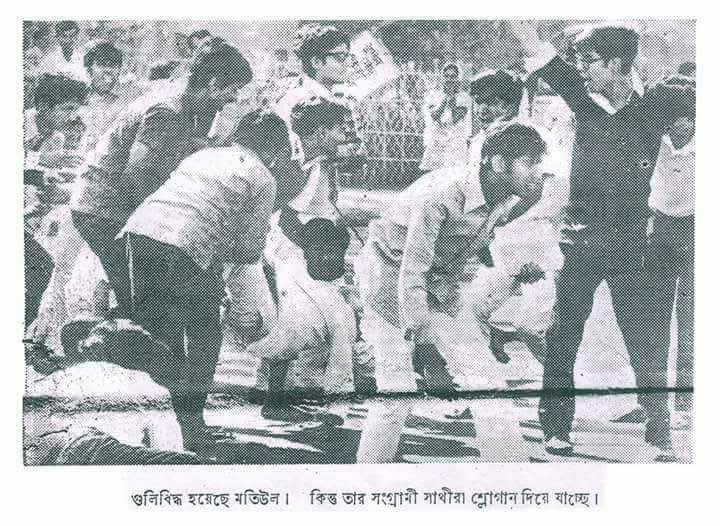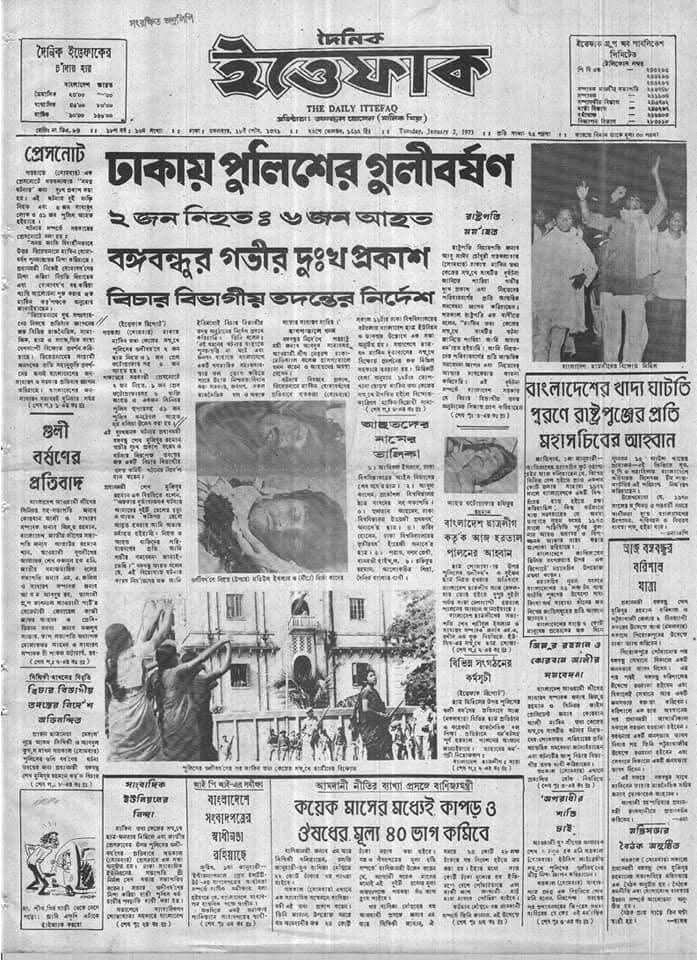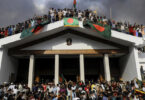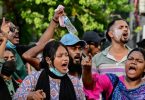By Mikha Piregu – Vice President, Bangladesh Students’ Union
January 1, the first day of the English calendar year, carries a rich legacy in the fight against imperialism—a day imbued with passionate spirit. It stands as a remarkable and unprecedented milestone in the global efforts for unity, solidarity, and alliance among the oppressed and working masses resisting imperialism. On January 1, 1973, Bangladesh, a newly established country on the global stage, resisting imperialist forces, became the first to stain its streets with the blood of students during a Vietnam solidarity march, which was met with police gunfire. Student union leaders Motiul Islam and Mirza Kauder were killed, while Parag Mahbub, Farid Hossain, Amirul Islam, Sultan Ahmed, and others were injured.
At the time, the imperialist invasion by the U.S. military was devastating Vietnam. Following Bangladesh’s independence, the Bangladesh Students’ Union commenced its new quest for a secular, democratic, and socialist nation, along with a liberated, student-friendly atmosphere in every educational institution. It also supported the efforts of individuals across the globe. In late 1972, students staged protests against the brutal assault by the USA on Vietnam, similar to actions taken by students worldwide. January 1 was designated as Vietnam Solidarity Day. Following a student assembly at Battala, students proceeded in a rally to present a memorandum to the American Embassy. During the course of the peaceful demonstration, law enforcement and police forcefully intervened. There was a sudden burst of intense gunfire at the rally. Two students lost their lives immediately, and numerous others sustained severe injuries. BSU activists Motiul Islam and Mirza Kauder sacrificed their lives in the struggle against imperialism. This tragic event ignited a passion for freedom in the students’ minds.
Under public pressure, the government sought an apology and later accepted the students’ demands, which included recognizing the Revolutionary Government of Vietnam. As a result of this movement and the sacrifices made, Bangladesh became the first non-communist nation to acknowledge the Revolutionary Government of South Vietnam and the National Liberation Front.
The Bangladesh Students’ Union and DUCSU jointly decided to celebrate Anti-Imperialism Solidarity Day on 1 January 1973, aiming to build an anti-imperialist mass movement by consolidating all protests. It was decided to conclude the student rally from Dhaka University’s Battala and send a memorandum to the U.S. Embassy at Adamji Court, demanding an end to U.S. aggression in Vietnam. A student rally was held at Battala under the chairmanship of the then-president of the Bangladesh Students’ Union and Vice President of DUCSU, Mujahidul Islam Selim. Later, the protest march began toward the U.S. Embassy. Police opened fire as soon as thousands of voices chanted slogans against imperialism in front of the then USIS (United States Information Center). The students fell on the streets under police fire. Dhaka University student leader Motiul Islam and Dhaka College student Mirza Kauderul Islam were martyred.
The self-sacrifice of Motiul and Kauder elevated the anti-imperialist mass liberation movement to a unique level, setting an unprecedented example of unity and solidarity in the global anti-imperialist struggle. Their sacrifice turned the Vietnam Solidarity Movement into a mass movement. Due to the intensity of the movement, the government recognized the Provisional Revolutionary Government of Vietnam, opened a Vietnamese embassy in Dhaka, and withdrew USIS. In 2000, the Vietnamese government recognized martyrs Motiul Islam and Mirza Kauder as national heroes of Vietnam.
The genocide perpetrated by the Israeli army in Gaza today is not an accident, but the logical outcome of an imperialist and colonial project established at the end of the 19th century: Zionism, which extends U.S. imperialism. In Bangladesh, imperialism protects its interests through the World Bank, IMF, and WTO, without war but through legal processes, various development models, and collaborations. Governments, bureaucracies, consultants, corporate media, NGOs, and civil society often act as its vehicles, reaping significant commissions.
Thus, imperialist aggression in Bangladesh operates under the guise of “development before democracy,” the UGC’s 30-year strategy of destroying education, and handing over energy resources to multinational corporations through policies like PSC-2012 and agreements like TIKFA. The invasion and plunder by imperialism in Bangladesh can be seen in numerous secret and public agreements, development policies, and the ruling class’s educational philosophy.
Because of India’s imperialistic nature, there has been a scheme to undermine Bangladesh’s sovereignty by permitting India access to ports, rivers, and roads through various transit agreements. In addition to the transit agreement, over the past fifteen years, numerous military-civilian agreements related to power, energy, maritime matters, trade, and defense have been established with India. However, no discussions or debates were held regarding these agreements in Bangladesh, and the citizens of the country were not informed about their details.
The limited details disclosed through various means indicate that these agreements fail to serve Bangladesh’s national interests. For instance, the Rampal project, a collaborative investment initiative between India and Bangladesh, has 70 percent of its overall expense financed through Indian loans, which Bangladesh is obligated to repay with interest. Moreover, there exists a significant risk of harm to the Sundarbans due to pollution from coal-fired power stations. Similarly, the decision to purchase electricity from Adani contradicts national interests. Due to the high prices of coal and capacity charges, Bangladesh faces no penalties, while Adani is exempt from penalties as well. Although Adani benefits from tax breaks granted by the Indian government, these concessions are not reflected in the electricity prices paid by Bangladesh.
Therefore, the interim government must prioritize releasing all agreements made with India by the previous administration and nullifying those that contradict Bangladesh’s national interests. In certain instances, India has denied Bangladesh benefits without entering into any formal agreements. One example is the unresolved Teesta Treaty.
India’s assertive approach is also evident in its management of borders. The Border Security Force (BSF) of India frequently engages in shootings or tortures individuals from Bangladesh. The struggle against Indian dominance must persist to prevent further border violence and protect Bangladesh’s sovereignty.
Therefore, the invasion and plunder of imperialism in Bangladesh must be acknowledged in numerous secret and public agreements, development policies, and the educational philosophy of the ruling class. In this context, it is the indispensable duty of the left-progressive forces in Bangladesh to build a united anti-imperialist movement.
We must consider some of the fundamental conflicts in this region through various mass movements and class-based movements to advance the anti-imperialist struggle, which will naturally vary according to the realities on the ground. These conflicts include the struggle between the masses and the imperialist agents of the ruling class, the tension between unproductive landowners and peasants, and the opposition between the working class and the military and civilian proxy bourgeoisie. Additionally, there is the ongoing conflict between corporate imperialism and U.S. imperialism and the masses, as well as the clash between oppressed ethnic groups and the fascist ruling class.
We must confront imperialism by championing the fight for human freedom, the pursuit of human rights, and the effort to establish a socialist society free from exploitation and discrimination. Those of us who have already joined the movement for human freedom must recognize our responsibility. It is essential to resolutely oppose racial oppression caused by imperialism, fascism, colonialism, and reactionary capitalist nation-states. We must resist ethnic sectarianism and advocate for the peaceful resolution of ethnic disputes. The hostility, resentment, and dominance exhibited by regressive ruling factions within their own ethnic groups toward others must be firmly contested. The fight against imperialist wars and aggression should be emphasized with a focus on imperialism rather than the imperialist nation itself. In the anti-imperialist movement, individuals worldwide—including those from colonial and neo-colonial regions, as well as the working class in imperialist nations—must unite and cultivate international solidarity against corporate imperialism.
January 1, 1973, will endure as an inextinguishable flame in the ongoing fight against imperialism. Martyrs Motiul Islam and Mirza Kauderul Islam will forever remain symbols of resistance against imperialism and champions in the struggle for human liberation. The Bangladesh Students’ Union is demanding national recognition of January 1 as National Anti-Imperialism Solidarity Day.







